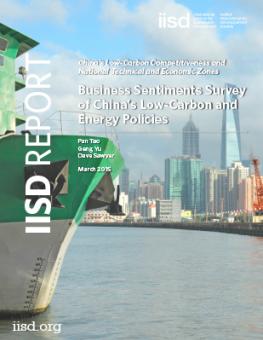
Business Sentiments Survey of China’s Low-Carbon and Energy Policies
The International Institute for Sustainable Development has been conducting a project to assess how China’s technical and economic industrial zones are interacting with the emerging low-carbon and energy policy framework.
A major focus of the work is to assess the effectiveness of the policy environment from a business perspective, with the intention of providing policy-makers in government and industrial zones with information to help shape future policy design.
This report presents the results of a survey assessing business perceptions of the emerging low-carbon and energy policy framework. Starting in May 2014, 1,000 Chinese companies were surveyed, with 230 completed questionnaires from both light and heavy manufacturing facilities in 16 provinces. In addition to these online surveys, 12 in-depth interviews and site visits were completed, and a number of workshops were held to solicit input.
Through our work, we sought to understand how industry is managing their energy and greenhouse gas emissions. We asked a series of questions about internal management systems and practices, differentiating results by the size of participating facilities based on energy use. We asked a series of questions about business perceptions on the effectiveness of the current energy and low-carbon policies. We sought to understand the range of policies affecting business, as well as perceived barriers that limit how firms respond. We then asked how firms might improve policy effectiveness from an administrative perspective as well as identifying the types of policy instruments that are preferred by industry. We then sought to identify the capacity needs of industry, focusing on the types of training and knowledge firms are seeking.
Based on the analysis, we identified opportunities to strengthen the current policy environment, highlighting areas where policy-makers might coordinate and strengthen policy. A series of recommendations also aim to make policy more efficient and to achieve the energy and emission goals of the policies, while keeping costs low to maintain industry competitiveness.
To our knowledge, this is the first systematic survey of business perceptions of China’s carbon and energy policies. Given the rapid development and deployment of low-carbon and energy policies, we fully recognize that significant work has been undertaken to implement a comprehensive set of policies. In that light, this report is intended to help policy-makers and business alike better understand the current system, while providing a window into how policy might be designed to be more effective and efficient.
Additional downloads
You might also be interested in
Heatwaves to hit China once every 5 years as global extreme weather events multiply, study finds
Record-breaking heatwaves that have scorched North America, Europe and China are set to worsen in future unless the world stops burning fossil fuels, according to a study by the World Weather Attribution (WWA) academic initiative.
Transition from fossil fuels to renewable energy can pose fiscal challenges for India: study
The global transition away from fossil fuels to renewable energy sources could trigger financial challenges for India and major developing countries such as Russia, Brazil and China because of their high dependence on revenues from fossil fuel, according to a study by the International Institute for Sustainable Development (IISD).
IISD Report: Shifting Away from Fossil Fuels Could Lower BRIICS Nations' Revenues
A new report by the International Institute for Sustainable Development (IISD), titled Boom and Bust: The Fiscal Implications of Fossil Fuel Phase-Out in Six Large Emerging Economies, looks at the potential financial ramifications of phasing out fossil fuels in six emerging economies — Brazil, Russia, India, Indonesia, China, and South Africa (BRIICS). They must begin adjusting their fiscal policies to account for declining fossil fuel use or risk a $278 billion revenue gap by 2030.
India, 5 others face fall in fossil fuel revenues
As the global clean energy transition gathers pace, six emerging economies need to start adjusting their fiscal policies now to account for declining fossil fuel use-or risk a $278 billion gap in revenues by 2030, equivalent to the combined total government revenues of Indonesia and S. Africa in 2019, according to a new report by the International Institute for Sustainable Development.